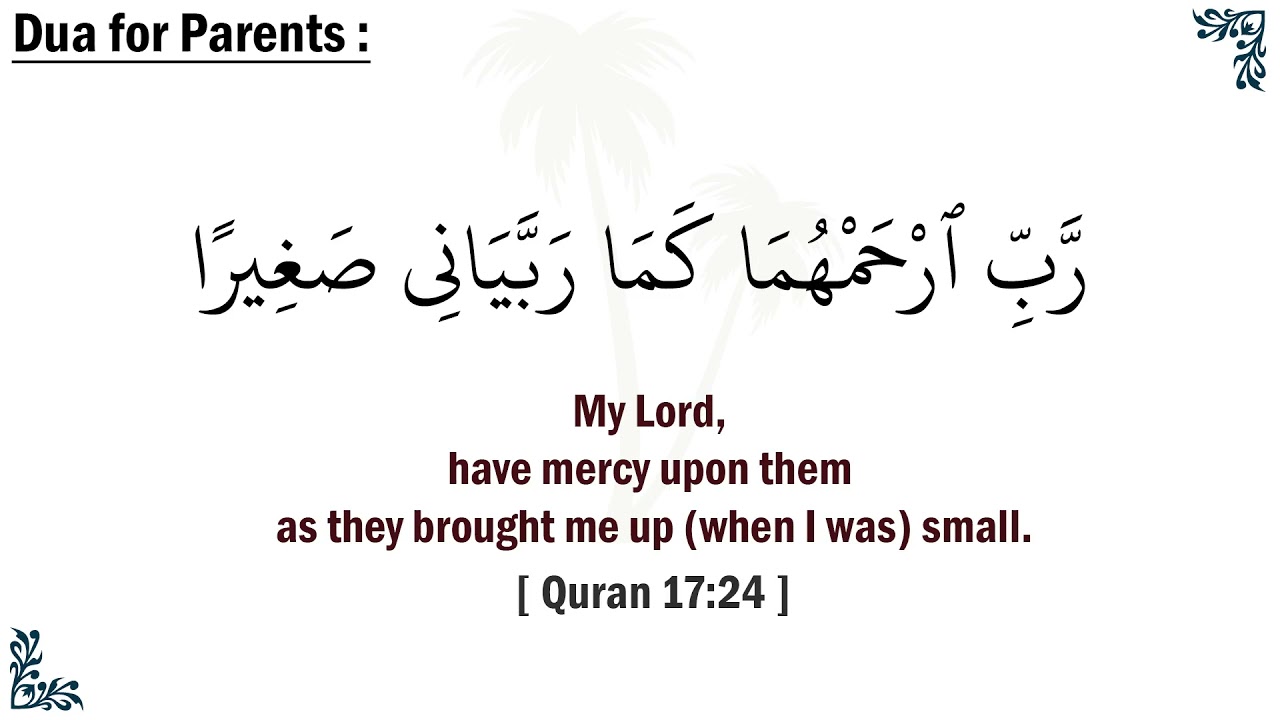Dua For Parents

In every culture and religion, parents hold a revered place. They are the pillars upon which families are built, the guiding lights that navigate their children through the journey of life. In Islam, the status of parents is elevated to a divine level, emphasizing their rights and the obligation of kindness, respect, and care towards them. Among the most profound ways to honor and supplicate for parents in Islam is through dua, or prayer.
Dua, an Arabic word that translates to “invocation” or “supplication,” is a profound act of worship in Islam. It’s a direct communication between the believer and the Almighty, where one expresses their deepest desires, gratitude, and needs. When it comes to parents, dua holds exceptional significance. It symbolizes the recognition of the blessings bestowed upon us by the Creator through our parents and serves as a means to seek blessings, mercy, and forgiveness for them.
The Quran, the holy book of Islam, repeatedly emphasizes the importance of being dutiful and kind to parents. In numerous verses, Allah commands believers to show kindness, respect, and obedience to their parents, regardless of the circumstances. One of the most famous verses highlighting this duty is found in Surah Al-Isra (17:23-24), where Allah says:
“And your Lord has decreed that you not worship except Him, and to parents, good treatment. Whether one or both of them reach old age [while] with you, say not to them [so much as], ‘uff,’ and do not repel them but speak to them a noble word. And lower to them the wing of humility out of mercy and say, ‘My Lord, have mercy upon them as they brought me up [when I was] small.'”
This verse encapsulates the essence of filial piety in Islam and underscores the significance of treating parents with utmost kindness and respect. Moreover, it introduces the concept of making dua for parents by invoking the mercy of the Almighty upon them.
Dua for parents is not merely a ritualistic act but a profound expression of love, gratitude, and concern. It reflects the believer’s acknowledgment of the sacrifices, efforts, and prayers of their parents throughout their lives. Through dua, one can repay, albeit incompletely, the debt of gratitude owed to their parents for nurturing, raising, and shaping them into the individuals they are.
The beauty of dua lies in its simplicity and accessibility. Unlike elaborate rituals or ceremonies, dua can be performed at any time, in any place, and in any language. It’s a direct line of communication with the Divine, where the sincerity of intention matters more than the eloquence of words. Whether it’s a whispered prayer in the depths of the night or a heartfelt supplication during moments of reflection, dua has the power to transcend barriers and reach the heavens.
Dua for parents encompasses a wide array of prayers, each seeking different blessings and outcomes. Some dua focus on seeking forgiveness for parents’ sins, others on asking for their well-being and longevity, and yet others on invoking Allah’s mercy and blessings upon them. Regardless of the specific content, the underlying intention remains consistent – to show gratitude, seek blessings, and ask for divine mercy for one’s parents.
Furthermore, dua serves as a means of strengthening the bond between parents and children on a spiritual level. It fosters a sense of interconnectedness and empathy, reminding both parties of their roles and responsibilities towards each other. When children earnestly pray for the well-being and happiness of their parents, it deepens the familial bond and cultivates a culture of compassion and love within the household.
Moreover, dua for parents instills humility and gratitude in the hearts of believers. It reminds them of their own mortality and dependency on the mercy of the Almighty. By beseeching Allah for blessings upon their parents, individuals acknowledge their own limitations and recognize that ultimate control rests in the hands of the Creator.
In addition to its spiritual significance, dua for parents has psychological and emotional benefits as well. It provides solace and reassurance to children, especially in times of distress or difficulty. Knowing that they have sought the mercy and blessings of Allah for their parents can alleviate worries and anxieties, offering a sense of peace and contentment.
Conclusion
Dua for parents is a sacred act of worship in Islam that holds immense significance and benefits. It is a manifestation of love, gratitude, and humility, strengthening the bond between parents and children and fostering a culture of compassion and empathy within families. As believers, it’s incumbent upon us to honor and supplicate for our parents, recognizing their sacrifices and seeking divine blessings for them. Through dua, we not only fulfill our religious obligations but also cultivate a deeper connection with the Divine, enriching our lives and the lives of our loved ones in the process






